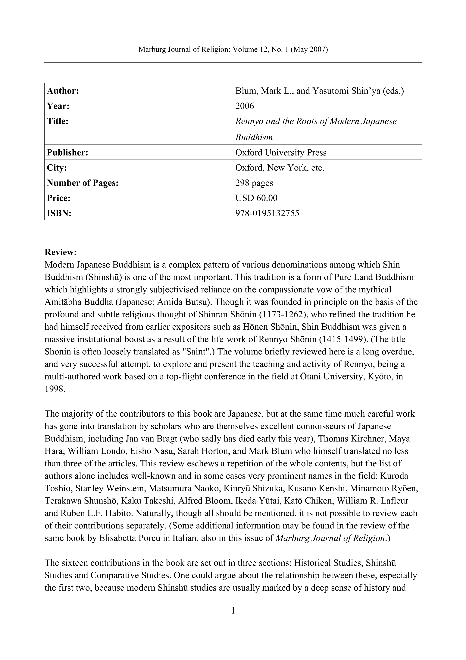Blum, Mark L., and Yasutomi Shin’ya (eds.): Rennyo and the Roots of Modern Japanese Buddhism
Modern Japanese Buddhism is a complex pattern of various denominations among which Shin Buddhism (Shinshū) is one of the most important. This tradition is a form of Pure Land Buddhism which highlights a strongly subjectivised reliance on the compassionate vow of the mythical Amitābha Buddha (Japanes...
محفوظ في:
| الحاوية / القاعدة: | Marburg Journal of Religion |
|---|---|
| المؤلف الرئيسي: | |
| التنسيق: | Artikel (Zeitschrift) |
| اللغة: | الإنجليزية |
| منشور في: |
Philipps-Universität Marburg
2007
|
| الوصول للمادة أونلاين: | الوصول للمادة أونلاين |
| الوسوم: |
إضافة وسم
لا توجد وسوم, كن أول من يضع وسما على هذه التسجيلة!
|
| الملخص: | Modern Japanese Buddhism is a complex pattern of various denominations among which Shin Buddhism (Shinshū) is one of the most important. This tradition is a form of Pure Land Buddhism which highlights a strongly subjectivised reliance on the compassionate vow of the mythical Amitābha Buddha (Japanese: Amida Butsu). Though it was founded in principle on the basis of the profound and subtle religious thought of Shinran Shōnin (1173-1262), who refined the tradition he had himself received from earlier expositors such as Hōnen Shōnin, Shin Buddhism was given a massive institutional boost as a result of the life-work of Rennyo Shōnin (1415-1499). (The title Shōnin is often loosely translated as "Saint".) The volume briefly reviewed here is a long overdue, and very successful attempt, to explore and present the teaching and activity of Rennyo, being a multi-authored work based on a top-flight conference in the field at Ōtani University, Kyōto, in 1998. |
|---|---|
| DOI: | 10.17192/mjr.2007.12.3609 |
 Publikationsserver
Publikationsserver